Introduction
Kali Linux is a Debian-based Linux distribution focused on digital forensics and penetration testing. It comes preinstalled with hundreds of tools used to test and exploit vulnerabilities in networks and systems. Since Kali Linux is used to probe cybersecurity, using a VPN is crucial to hide the real IP address and location of the user while conducting assessments.
A VPN, or Virtual Private Network, encrypts internet traffic and routes it through a remote server, hiding the user’s IP and obscuring their digital footprint. This is essential for Kali Linux users who wish to keep their identifying details private and secure their connections while testing networks.
VPN Technologies
There are two main architectures for how VPNs operate:
Remote Access VPNs
Remote Access VPNs allow individual devices like laptops, phones, and tablets to establish an encrypted tunnel to a VPN server through the public internet. All device traffic gets routed securely through the VPN tunnel to emerge with the IP address of the VPN server rather than that of the connecting device. Remote Access configurations make up most consumer VPN services.
Site-to-Site VPNs
Site-to-Site VPNs connect entire private networks across dedicated infrastructure like office branches or data centers. Encrypted tunnels link the sites directly, enabling systems at different physical locations to communicate privately through the protected pathway. Routing all inter-office traffic through these specialized high-capacity VPN links furnishes security measures for corporate IT resources and Internet breakout filtering controls.

VPN Options for Kali Linux
Kali Linux users can leverage both commercial VPN providers and open-source VPN software to enable encrypted remote access and anonymization:
Commercial VPN Services
Top-rated premium VPN services like ExpressVPN, NordVPN, Surfshark, and CyberGhost offer custom Kali Linux installation guides and optimized Linux clients to quickly get connections established. Their worldwide server networks promise solid speeds, low latency and access to foreign content. Many services allow torrenting or provide dedicated IP options.
OpenVPN
OpenVPN is a widely trusted open-source VPN solution using SSL/TLS encryption protocols to establish secured point-to-point connectivity. Capable of traversing network address translation and firewalls, OpenVPN furnishes reliable Remote Access VPN capabilities if premium services get blocked or restricted by testing targets.
WireGuard
An emerging VPN protocol focused on speed and simplicity is WireGuard – its Linux roots and crypto key authentication model integrate nimbly within Kali. Minimal setup requirements and lightweight operation make WireGuard suitable for both Remote Access usage and quick machine-to-machine links if assessing site-to-site configurations.
Installing a VPN on Kali Linux
Commercial VPN services simplify connectivity the most by handling complex configurations behind easy to use apps and programs:
- Sign up for a chosen VPN provider account with credentials
- Download the Linux VPN app from the provider’s website
- Install the OpenVPN or WireGuard compatible .deb package file
- Launch the app and input your login details to connect
OpenVPN requires more manual configuration editing the /etc/openvpn directory files for the necessary certificates, keys, and network routing rules depending on protocol chosen. Static keys then furnish connectivity each session without per app login.
Using ProtonVPN on Kali Linux
ProtonVPN offers advanced VPN protection powered by Secure Core infrastructure routing traffic through hardened servers before exiting to destination sites. This provides enhanced privacy and anonymity benefits ideal when probing networks and applications using Kali penetration testing tools:
Setup Steps:
- Register for a free or paid ProtonVPN account
- Add Linux to account supported devices
- Download the OpenVPN configuration files
- Transfer files to Kali Linux system
- Modify OpenVPN directory and rules to use transferred ProtonVPN credentials
- Connect via OpenVPN terminal using supplied configuration
Once configured following ProtonVPN’s Kali guides, the service furnishes protection even if testing high-security networks, as all penetration testing would occur ethically and legally with proper authorization.

Conclusion
Kali Linux users perform valuable cybersecurity enhancement but require measures like VPN usage to operate ethically and keep their own details secured.
Leveraging reputable premium VPN providers through their custom Linux apps provides reliable worldwide access, speeds and privacy for those using Kali appropriately. OpenVPN and WireGuard furnish free alternatives configurable for Remote Access needs if testing budget VPN restrictions.
Above all, obeying laws and penetration testing solely on authorized systems upholds ethical standards around assessing digital vulnerabilities in a constructive manner through privacy-preserving tools like Virtual Private Networks.
Introduction
Onion Over VPN refers to the approach of routing traffic through the Tor anonymity network after establishing an encrypted VPN tunnel. This combines the protections of a VPN with the multilayer encryption of Tor to provide enhanced privacy, security and anonymity while online.
For activists, journalists, whistleblowers and those requiring an extra layer of confidentiality for work or personal safety, Onion over VPN merits consideration given the amplifying impact on safeguarding digital communications and obscuring traffic analysis. This guide explains the constituent technologies securing Onion Over VPN connections and best practices for setup.
What is a VPN?
A Virtual Private Network (VPN) serves as an encrypted tunnel for web traffic flowing between your local device like a computer or smartphone and the internet. VPNs protect online transmissions against surveillance and interception by third parties on local networks you use through public Wi-Fi, your ISP, or infrastructure players along the routing path.
VPNs work by funneling traffic leaving your device into an encrypted wrapper that travels securely over the web within segmented pipelines called VPN tunnels until reaching the exit node server operated by your VPN provider. Through this one-hop architecture, no other systems view traffic payloads as encryption keys only reside on your device and the VPN server.
To any observers, local network or sites you access, the VPN server IP address masks the identity of your device. This allows bypassing geographic content restrictions, maintaining anonymous internet use and hiding traffic from wider scrutiny. VPNs thus furnish essential privacy protections in an age of rampant data harvesting and fragile cyber defences.

What is the Onion Network and How Does it Work?
The Onion Network, commonly known as Tor, offers an alternate method of masking online activity and obscuring traffic routing to preserve anonymity. Rather than tunneling through one encrypted VPN channel, Tor bounces communications through a distributed relay network operated by volunteers worldwide. Encryption applied at each routing hop prevents tracking or tracing back to origin sources.
On the open internet, accessing a website directly connects your device IP address to that site – data flows directly exposing both recipient and requestor. Tor inserts unpredictability using a multi-hop pathway picking randomized relay nodes to form a circuit masking traffic content and participants alike through layers of encryption added at each relay point.
Only the final relay in the chain contacts the public-facing destination site to retrieve requested content before passing back down the relay sequence. Without knowing the full relay chain, external observers struggle guessing each previous link or originating source. Anonymity strengthens by distributing routing complexity across many volunteers.
Tor remains slower than typical web browsing given the unpredictable geographic relay paths scaling encryption processes but furnishes privacy unable to be matched by single hop VPNs alone – at least without additional measures described next with Onion over VPN.
Benefits of Onion Over VPN
Onion Over VPN sequences connections first by establishing an encrypted VPN tunnel from your device to a chosen VPN server before then routing traffic into the multi-layer Tor network. This combines strengths of both platforms:
- VPN encryption wraps initial connection to mask user device IP address
- Tor bounces subsequent anonymous traffic through randomized relay nodes
- No single point of failure if VPN or Tor node gets compromised in isolation
- Extra encryption layers prevent most sophisticated attacks and data harvesting
While the Tor network already allows anonymous website access and dark web navigation, VPN tunneling before Tor access prevents visibility of Tor usage itself to local networks. VPN masking also adds geographical diversity of connection entry points into Tor should relay nodes face restrictions by territory.
Without a VPN gateway initially, Tor usage can raise flags on restrictive networks automatically flagging or hindering access attempts. But tunneling first via VPN appears as standard encrypted traffic drawing little suspicion and bypassing Tor blocking efforts. This grants safer entry into the Onion network abroad.
For whistleblowers, investigative journalists, political dissidents and other high-risk groups, the hardened anonymization and traffic masking of Onion Over VPN defends against logging and surveillance efforts focused on identifying access to tools like Tor itself. The method aptly fulfills its aim upholding privacy rights equitably across the globe.

How Onion Over VPN Works
The process for Onion Over VPN works by first launching your selected VPN client application and connecting to a chosen VPN server just as during typical usage. By tunneling initially to the VPN server remotely, local network visibility gets cut off. This prevents detection of subsequent actions like accessing prohibited networks or applications by external observers or ISPs.
With the VPN engaged on your device, all internet traffic now funnels through the encrypted VPN pipeline masking both your original IP address and usage activity from visibility. VPN server IP addresses get assigned dynamically from pools shared across different customers, introducing further ambiguity countering tracking.
Once safely routed via the VPN tunnel bypassing local restrictions, users can then launch the Tor Browser application to access Onion sites or just privately browse the open internet with Tor protections now active. Since the VPN already hides your device IP and encrypts the connection, external parties no longer directly witness usage of Tor itself – just standard VPN traffic.
Inside the Tor browser running behind an active VPN, multi-layer encryption wrapping begins as browser traffic gets divided into smaller chunks before entering randomized relay paths selecting new Tor nodes on the fly. Each relay only knows the previous and next stops – never the whole circuit – achieving full anonymity. Additional VPN encryption applied transparently shields activity of using Tor browser itself from the local network perspective.
Onion Over VPN ultimately facilitates safe access and usage of Tor browser anywhere by sidestepping attempts to throttle or block access at the local level. Participants in the Tor network gain added privacy as well knowing entry points get masked by the VPN gateway, no matter if connecting from hostile territory suppressing privacy tools openly.
Using Onion Over VPN
The setup process for Onion Over VPN requires first selecting and installing a suitable VPN provider before separately downloading the Tor Browser application commonly used to access Onion sites and Tor network functionality. With software in place, connection involves:
1. Launch and Sign Into VPN App
Connect to preferred VPN server locale and activate encryption tunnel
2. Open Tor Browser
Initiate Tor Browser to spawn anonymity network access overlay
The VPN app handles site unblocking, encryption and masks user IP address from local network visibility. Meanwhile Tor Browser routes things further to access dark web .Onion sites safely or just browse the internet with added traffic privacy.
Many VPN providers boast compatibility with Tor access and related networks as a headline feature. But based on server proximity, reliable uptime and peak speed capacity, top performers like ExpressVPN, NordVPN or CyberGhost rate as leading options for pairing with Tor to empower Onion Over VPN capability.
Setting the sequence properly ensures the VPN connection opens the gateway for subsequent Tor traffic to traverse the relay circuit pathway. Without anchoring the VPN as the first hop, Tor network traffic could get exposed to external inspection before reaching onion routing privacy. Those new to blending VPN and Tor should study guides further outlining proper configuration.

Legal and Ethical Considerations
Despite furnishing universal access to information and privacy, authorities within several nations actively censor, throttle or outright ban availability of Tor browser under various national security or morality pretences. Examples such as Russia, Iran and Indonesia frequently attempt blocking Tor network access preventing relay routing entwined with VPN usage as well.
Accordingly, exercising due caution remains vital when pursuing Onion Over VPN setups granting restored Tor network access which could classify as unlawful usage depending on your location. Moreover accessing explicitly illegal or immoral content through any means still constitutes an offence in most regions regardless of encryption defenses employed.
All law-abiding citizens rightfully deserve basic privacy protections as a foundation of free speech, expression and open thought. However traversing the line from upholding personal liberties into willful illegal conduct stands as the reality for limited outlier users of these privacy tools. Finding balance between upholding ethical norms and advancing free access merits ongoing reflection.
Ascription of mere guilt by association with encryption tools alone undermines equality and inalienable personal rights. But escaping the ethical burdens of abetting truly criminal behaviour through wilful negligence about networks used also avoids moral duty. Good faith efforts reconciling such tensions around unblocked access versus ethical usage drive social progress.
Onion over VPN offers citizens worldwide universal reach to information access and privacy too commonly denied by institutions fearing transparency or scrutiny of their existence paradigm. Ensuring such empowering tools spread through patient diplomacy and leading by moral example can overcome restrictive policies over time. Change arrives through principled perseverance championing liberties for all humankind.
Introduction
Virtual private networks (VPNs) have become essential tools for protecting your online privacy and security. As more people rely on the internet for working, banking, communication and entertainment, the threats from hackers, mass surveillance and restrictive content blocking grow in parallel. Installing a robust VPN to encrypt traffic and mask your digital identity has become vital.
But the crowded VPN marketplace, overflowing with broken promises and lagging products, makes finding a truly trustworthy provider with the right feature mix challenging. Two leading solutions standing apart from most competitors are NordVPN and ProtonVPN. This comprehensive comparison analyzes all aspects of these two privacy champions to determine the ideal choice based on your individual needs and priorities around security, speeds, platform access, pricing and trust.
Security Technology Comparison
Any VPN provider lives and dies by the strength of its underlying security mechanisms for encrypting and routing traffic between your devices and their servers. Both NordVPN and ProtonVPN leverage industry-standard AES 256-bit encryption yet still implement this in slightly different ways.
NordVPN supports OpenVPN and IKEv2/IPsec VPN protocols across all major platforms while additionally offering WireGuard protocol accessible through NordLynx technology. Linux users can even enable obfsproxy for added stealth protection. ProtonVPN recently moved to support WireGuard connections but still relies more exclusively on OpenVPN otherwise across Windows, MacOS, iOS and Android clients.
Inspecting encryption algorithms or protocols alone doesn’t define security effectiveness for customers though – privacy and logging policies matter significantly as well. NordVPN and ProtonVPN share equally strong stances when it comes to enforcing reliable no-logs policies for all user activity covering both free and paid subscribers. Neither requires any personally identifying information to register an account.
Both providers route traffic through privacy-friendly countries as well with NordVPN concentrating infrastructure in Panama and ProtonVPN basing primarily out of Switzerland. Specific legal jurisdictions help separate each firm from intrusive data surveillance coalitions followed by businesses centered in countries party to intelligence sharing agreements. NordVPN and ProtonVPN sit evenly matched regarding baseline technology safeguards and commitments to protecting logs and user data.
Additional security tools differ slightly – NordVPN offers an automatic kill switch to disable internet access if the VPN connection falters inadvertently plus optional malware blocking. ProtonVPN counters with built-in Anycast DNS protection against poisoning attacks and DDoS resistance to keep servers harder to take offline. But no clear winner emerges based on security merits alone – both deliver excellent encryption, privacy policies and infrastructure.
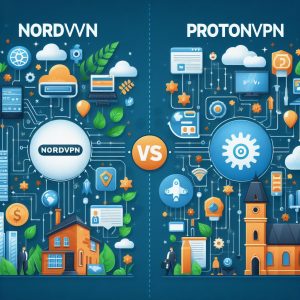
Speed and Network Coverage Comparison
Latency-sensitive applications like streaming HD video, gaming, business VoIP calls or backing up big files to the cloud demand consistently fast throughput. NordVPN and ProtonVPN operating at peak speeds transform any internet connection into a responsive high-bandwidth portal free of geographic restrictions.
Based on independent speed tests conducted on nearby servers, NordVPN averages between 50-80+ Mbps down on Windows and Android for downloads using updated Wireguard protocol via NordLynx. Speeds remain highly capable even over long distance connections across continents. However, using OpenVPN connections sees certain servers drop to 20-40 Mbps down at times. Results prove fast enough for most uses nonetheless.
ProtonVPN comes close to matching NordVPN’s throughput using WireGuard, likely benefiting as one of the early providers adopting the protocol. Speeds peak about 10% slower than NordVPN overall while running OpenVPN places performance more in the 30-50 Mbps down bracket. Minor speed differences don’t drastically impact normal VPN operation.
In server network scale and geographic distribution for accessing regionally restricted sites however, NordVPN does maintain a sizeable advantage. With over 5,500 servers across 59 countries worldwide, Nord outpaces ProtonVPN’s 1,700+ servers located in 63 regions – smaller server fleet translates into capacity limitations if connecting during high traffic periods. NordVPN’s bigger pipe capacity delivers more consistent speeds.
For the widest possible array of server options regionally to avoid traffic congestion and access content locally, NordVPN’s vastly bigger network pays dividends versus ProtonVPN’s smaller setup trailing on scale if not peak speed potential in given locations.
Privacy & Anonymity Comparison
Maintaining online anonymity requires more than just masking an IP address alone using any VPN app. How a provider manages and protects user account access, registration data, online activity tracking and other sensitive information also factor significantly towards privacy assurances.
As covered within the security discussion earlier, NordVPN and ProtonVPN adopt equally stringent no-logging policies for usage data covering free and paid subscribers alike. No activity logs or session timestamps get maintained on private servers controlled fully by each company respectively. As Iceland and Switzerland-based entities operating outside expansive data sharing agreements followed by US or EU-based tech firms, both possess freedom to court privacy-first users.
Differentiating factors around Nord vs Proton VPN anonymity controls mainly involve IP address visibility protections and account registration requirements. NordVPN allows signing up with just an email. You can even pay in anonymous cryptocurrencies like Bitcoin for total payment anonymity. Nord manages its own IP address pool as well using shared IPs across customers for added anonymity even if one IP gets blacklisted somehow.
ProtonVPN adheres to stricter Swiss privacy laws requiring actual validated IDs on certain payment methods. They also utilize third-parties for IP allocation through datacenters rather than fully controlling address sourcing directly. While ProtonSuite products all interoperate for customers invested fully in their ecosystem, NordVPN furnishes stronger privacy specifically around anonymous VPN access and activity masking protections for those wanting maximum secrecy.
For other users happy with benchmark online activity and traffic encryption but placing emphasis on legal jurisdiction, anonymous payment and sign-up controls in the name of absolute secrecy, NordVPN does satisfy those demands better than common identity and IP address handling in ProtonVPN accounts currently. Different priorities determine the right fit.
Specialized Server Comparison
Standard VPN features cater to the broadest user base focused purely on security, regional bypassing and basic traffic tunneling duties. But power users gain advantage selecting providers offering niche servers tackling specific demands like high-speed video streaming, P2P filesharing and gaming. Both NordVPN and ProtonVPN incorporate special server types but manifest these quite differently.
NordVPN operates dedicated servers explicitly labeled for individual activities like “Streaming VPN” and “P2P VPN” so users can instantly identify and connect through specialized infrastructure guaranteed to support bandwidth-hungry tasks. Dedicated IP servers also help folks needing to mask activity behind consistent IP as if coming from a personal source.
Instead of building out separate server groups, ProtonVPN approaches niche use support by ensuring all VPN servers sustain fast speeds capable of absorbing streaming, downloads and gaming. No need guessing the right specialty server as any works great. But ProtonVPN lags on static IP assignment capabilities for masking traffic behind a single address.
Usability conveniences clearly favor NordVPN furnishing one-click server types purpose-built to satisfy user intents be it streaming BBC iPlayer or torrenting Linux distributions. But Proton ensures universal servers sustain adequate speeds too. Catering to customers wanting to quickly spot specialty-tuned infrastructure to match activity at hand, NordVPN better targets non-standard use cases even as ProtonVPN looks to strengthen unique offerings like safe Tor access.

Platform and Device Support Comparison
The convenience of accessing a VPN should extend equally across the devices people use daily – phones, tablets, laptops, routers and more. NordVPN and ProtonVPN both deliver apps spanning leading desktop and mobile platforms yet still diverge when comparing capabilities.
NordVPN furnishes native VPN clients for Windows, MacOS, Android, iOS, Linux and Android TV systems. Strong router support further expands deployment options. ProtonVPN closely matches platform coverage on Windows, Mac, iOS and Android including router integration lacks Nord’s Linux and TV box compatibility currently.
In terms of simultaneous connections enabled per account, NordVPN allows six devices while ProtonVPN provides five device slots across mobile and desktop apps before needing to upgrade account tiers. Five connections sufficiently covers most households across different devices with room to add one or two extra as family needs grow. Nord merely builds in overhead upfront.
For always-on VPN routing across tablets, phones, smart TVs and Wi-Fi appliances via apps and router integration alike, ProtonVPN fills essential app access duties while NordVPN extends slightly further across emerging device frontiers. People invested heavily in mobile life appreciate Nord’s Android TV and Fire TV support. But core desktop and mobile users remain equally served.
Cost Comparison
Evaluating VPN subscription value ultimately weighs functionality benefits against annual costs across different providers. Signing up for 1-3 years brings down effective monthly pricing but still requires careful analysis factoring device connections and feature utility matched to individuals.
NordVPN costs $11.95 monthly, dropping sharply to $4.92/month or $3.71/month on 1 or 2 year plans respectively. Notably every tier supports connecting 6 devices simultaneously – exceptional flexibility for larger families without paying multiple accounts. Uncommon but seasonal discounts or bundling deals on 2-3 year terms can push multi-year pricing under $3 monthly.
ProtonVPN asks $9 monthly for standard plans while paid 2-year packages bring equivalent monthly costs down to $5 making its value proposition extremely competitive with other leaders in the space on hot features like P2P support and streaming access. However, recall ProtonVPN only bundles 5 device connections per standard subscription versus NordVPN’s 6 device allotment. For larger households, that limitation closes any effective price gap.
Introduction
Virtual private networks (VPNs) have become essential tools in the quest to protect one’s privacy and security online. By encrypting internet traffic and routing it through remote servers, VPNs allow users to hide their IP addresses, location data, and online activities from cybercriminals, surveillance, and other threats.
With many VPN services on the market, it can be tough deciding which one best suits your needs. Two of the most prominent names in consumer VPN services are NordVPN and Norton VPN. But how do they stack up when it comes to features, security protections, network speeds, compatibility, pricing, and overall value? Let’s evaluate them side-by-side.
NordVPN Overview
NordVPN rightfully earns recognition as an industry leader in the VPN space. It consistently ranks near the top of lists of the best VPNs thanks to its emphasis on advanced security combined with excellent network performance.
NordVPN utilizes military-grade AES-256 encryption to secure user traffic along with support for VPN protocols like OpenVPN, IKEv2/IPsec, WireGuard, and NordLynx to enable fast and stable connections. Privacy assurances come from its independently audited no-logs policy and Panama-based jurisdiction outside intrusive surveillance alliances.
Several features provide additional security layers in NordVPN like an automatic kill switch to block internet access if the VPN connection fails, cybersecurity malware blocking, IP and DNS leak prevention, and Onion Over VPN encryption routing traffic through the Tor network. Unique aspects like NordVPN Teams cater towards business customers as well.
Boasting over 5,500 worldwide servers across 59 countries, few VPNs can compete with NordVPN’s massive server infrastructure and equally impressive speeds. Tests confirm impressive results – average download speeds exceeding 70Mbps on nearby servers using NordLynx or WireGuard protocols and strong performance across short and long-distance connections alike.
NordVPN apps support all major platforms like Windows, Mac, iOS, Android, and Linux. Configuration files even allow manual router-based setup. Six devices can use the VPN simultaneously per Nord account. For power users desiring advanced privacy tools and blazing fast speeds from anywhere, NordVPN satisfies those demands at competitive pricing scaled to individual needs.

Norton VPN Overview
Symantec’s Norton brand brings over three decades of cybersecurity expertise to its Norton VPN product. Bundled with premium Norton 360 plans or available separately, Norton VPN focuses strongly on core security foundations you’d anticipate from such an established name.
Like NordVPN, Norton VPN relies on industry standard 256-bit AES encryption for securing traffic between devices and its VPN servers. Support currently includes only the OpenVPN protocol, however. On the privacy front, Norton VPN follows essential no-logging principles to prevent activity monitoring or tracking. IPv6 and DNS leak protection works to block identifying connection data exposures too.
Independent speed tests reveal fairly capable but not standout performance for the Norton VPN network. Download speeds average less than 30Mbps while streaming/torrenting accessibility sees mixed results compared to NordVPN’s level of platform support. This speed and compatibility disparity largely owes to Norton’s much smaller server network footprint – just over 200 VPN servers currently concentrated in North America and Europe.
The Norton VPN platform catalogue covers Windows, Mac, iOS, and Android devices currently. Browser extensions provide quick access to VPN protection when web surfing on desktop devices. Simultaneous connections allow for securing 2 devices per Norton VPN subscription, with 5 device subscriptions offered at an added cost.
Effective monthly pricing can range from $7.99 initially down to $2 if signing up for longer 2-5 year subscription terms. Bundling with Norton 360 suites adds even more potential value for those invested fully in Norton products. But standalone only subscribers have fewer devices covered under default Norton VPN plans.
Compare Security & Privacy Technology
When evaluating virtual private networks, the underlying technology used to encrypt and secure user traffic remains paramount. Both NordVPN and Norton VPN deliver industry standard 256-bit AES encryption to start. However, NordVPN supports additional protocols (OpenVPN, IKEv2, WireGuard) considered newer and more advanced versus Norton’s lone reliance on OpenVPN currently.
From network architecture to hosted server locations, NordVPN distributed model and Panama jurisdiction steer clear of mandatory data sharing alliances followed by many tech companies hosting infrastructure within countries party to intelligence sharing agreements. Norton’s ownership by US-based company NortonLifeLock could increase obligated government disclosure risks by comparison.
Both firms rightly emphasize no-logging policies for user activity tracking, but NordVPN undergoes independent audits to verify its internal controls around protecting customer data. Norton VPN otherwise lacks third-party validation testing to confirm its systems avoid recording user logs or any session metadata. If provable, externally validated privacy assurances hold importance, NordVPN therefore pulls ahead.
For the strongest device-to-server encryption, widest protocol support, and demonstrated commitments to business practices and policies upholding user privacy before authorities, NordVPN rates as the more complete package over Norton VPN’s connected security offerings.
Network Performance & Speed Comparison
Once fundamental security measures prove reliable, a VPN’s effectiveness further depends on consistent server availability and connection speeds accommodating general web access, streaming, gaming and other use. By these measures, NordVPN simply operates in a different class than Norton VPN currently.
NordVPN’s network comprised of over 5,500 servers across 59 countries dwarfs Norton VPN’s footprint of 200+ servers in just a couple dozen regions. More server options not only increase chances to bypass regional blocking of sites but provide added bandwidth capacity and less congested resource allocation to users. These architectural differences manifest noticeably when comparing performance.
Independent speed tests show NordVPN averaging download speeds exceeding 70 Mbps on nearby servers utilizing its fastest WireGuard protocol. Netflix HD streaming, 4K video chat sessions, and large file downloads all maintain responsiveness thanks to Nord’s well-provisioned infrastructure. Norton VPN peaks around 25 Mbps down with greater inconsistency across locations and latency-sensitive applications.
Upload speeds follow a similar trajectory – NordVPN pushing 35 Mbps up on averages whereas Norton VPN trails well below at less than 15 Mbps up, likely reflecting congestion on its simple network. Speed gaps and server resource allotments between the two services remain consistently sizable.

Platform & Device Support Comparison
A quality VPN provider needs to make accessing its encrypted tunnel simple across the devices people own today from Windows and Mac computers to iPhones, Android tablets and more. NordVPN and Norton VPN share broad platform support but still diverge when inspecting device connection allowances.
In terms of native OS app support, NordVPN and Norton VPN both offer desktop clients for Windows and Mac devices alongside mobile apps spanning iOS and Android devices. NordVPN ups compatibility a further notch on Linux distro environments. Browser extensions are available from both to simplify activating protection while web surfing as well.
However, when it comes to number of simultaneous device connections allowed per account, NordVPN allows 6 devices while Norton VPN only enables 2 devices on standard plans. People managing VPN coverage across numerous smartphones, laptops, tablets and more for family members appreciate Nord’s significantly higher capacity.
For the widest range of apps tailoring the VPN experience to major computing platforms along with support for nearly triple the devices covered on a single account, NordVPN once again outclasses Norton VPN on flexibility and subscription plan value.
Pricing & Subscription Value Comparison
At the end of the day, most consumers weigh the affordability of a VPN’s asking price against its real-world performance and feature set. By such a total value analysis, NordVPN consistently delivers lasting savings and function versus Norton VPN’s sticker pricing.
NordVPN pricing starts at $11.95 monthly but swiftly drops to $4.92 monthly or $3.71 per month when billed over longer 1 to 2 year terms. Notably every Nord tier allows connecting 6 devices simultaneously – a subscription cap 3 times higher than Norton VPN’s standard 2 device plan limit. For multi-user savings across the household, NordVPN requires no extra charges.
Comparatively, standalone Norton VPN pricing also starts higher at $7.99 monthly, falling to $4.99 on year commitments or as low as $2 monthly on 5-year agreements, if practical. But restricting most users to only 2 device allotments per subscription leads to likely upgrade costs just to secure additional gadgets.
Factoring device connection limits affecting larger households, even when accounting for Norton’s cheapest extended terms, on a per protected device basis NordVPN either beats or at minimum matches Norton’s effective VPN access pricing with 3 times the network capacity. Combined with generally superior app platform support and vastly better speed performance stemming from its vastly bigger server infrastructure investments, NordVPN easily justifies its value versus any perceived cost savings from Norton VPN operated on a closed, underpowered network architecture limiting practical everyday utility for customers.
Conclusion – NordVPN Is the Clear Winning Choice
When objectively comparing all vital criteria ranging from security and privacy protections through network performance, access capacity and subscription value across devices, NordVPN consistently and comprehensively proves itself the superior VPN provider compared to Norton VPN.
Only in the realm of absolute base price does Norton seem more affordable on first glance. But those temporary long-term rate savings quickly require upgrade fees just to secure additional household devices as per user needs rise. And skimping on server infrastructure investments directly manifest in dramatically slower Norton VPN speeds impeding many popular streaming and web activities.
Introduction
Choosing the right virtual private network (VPN) is an important decision that can have major implications for your online privacy, security, and accessibility. With so many VPN providers on the market, it can be difficult to determine which one best fits your needs. Two of the most well-known VPN services are NordVPN and Hotspot Shield.
This article provides an in-depth comparison of NordVPN and Hotspot Shield across a number of categories, including pricing and plans, server network and speeds, security features, streaming capabilities, user experience, and more. By evaluating the strengths and weaknesses of each VPN, you will be better equipped to select the right one based on your personal priorities, budget, and use case. Keep reading for a comprehensive analysis to help inform your decision between these two popular services.
Pricing and Plans
Pricing is often one of the first considerations when selecting a VPN. NordVPN and Hotspot Shield offer competitive pricing structures, but there are some key differences in their subscription plans.
NordVPN’s starting monthly price is $11.95, making it a mid-range VPN in terms of upfront cost. With the 2-year plan, the monthly cost drops to only $3.29. NordVPN allows connecting 6 devices simultaneously per subscription, which is generous for individuals and small households. Occasional discounts and seasonal sales help offset the already reasonable pricing.
Hotspot Shield’s monthly pricing starts lower at $7.99/month. Their 1-year plan brings the monthly average to $4.99, while the 5-year plan drops it further to $2.49/month. Support for 5 concurrent connections per subscription is still solid for personal use. Hotspot Shield offers introductory discounts on first-time purchases and through some partner websites.
When it comes to number of devices covered and overall value for money over longer subscription durations, NordVPN compares very favorably to Hotspot Shield’s pricing. Multi-year discounts are steeper for NordVPN, and the extra supported device per plan is a nice benefit, especially for larger families. Both VPNs offer affordable entry points for budget-focused users.
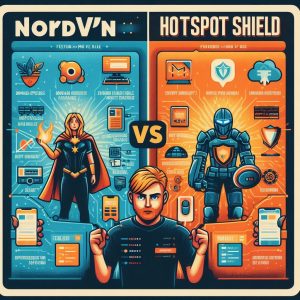
Server Network and Speed
Two essential metrics for evaluating VPN performance are server network reach and connection speeds.
NordVPN has over 5,600 servers located in 59 countries worldwide. This extensive server infrastructure provides more options for accessing geo-blocked content and obscuring your digital footprint. Independent speed tests clock NordVPN at an average of 53Mbps download speeds and 51Mbps upload on nearby servers using the Wireguard protocol. Speeds are consistently fast across short and long-distance connections.
Hotspot Shield has around 1,800 servers in more than 80 countries. While wider global reach is a selling point, fewer servers can result in more congested traffic and slower speeds for users in some regions. Average Hotspot Shield download speed comes in at around 45 Mbps, with upload speeds trailing at 36 Mbps based on third-party evaluations. Speed test results can be inconsistent across locations.
For large server networks that deliver reliably fast connection speeds, NordVPN excels compared to Hotspot Shield’s smaller VPN infrastructure. More server options enhances accessibility without sacrificing speed for NordVPN customers. Both services do enable accessing streaming sites like Netflix and BBC iPlayer. Ultimately NordVPN takes the advantage when it comes to server infrastructure scalability and speed performance.
Security and Privacy Features
Robust security and privacy tools are prerequisite expectations for premium VPN services nowadays. Both NordVPN and Hotspot Shield incorporate advanced encryption and additional protection measures.
NordVPN uses AES-256 bit encryption and supports OpenVPN, IKEv2/IPSec, and WireGuard protocols. These industrystandard encryption and protocols provide a very secure, fast foundation. Beyond encryption, NordVPN operates a strict no-logs policy for user activity and has undergone independent audits to back up its privacy claims. An automatic kill switch, cybersec malware blocking, and onion routing are extra layers of protection and anonymization provided to all users.
Similar to NordVPN, Hotspot Shield relies on AES-256 bit encryption and supports OpenVPN connections. No connection or activity logs are maintained. Unique features include its proprietary Hydra protocol, which camouflages VPN traffic to avoid deep packet inspection. IP and DNS leak protection works to prevent identifiable information exposure. The built-in firewall monitors network traffic as well. No kill switch is available to instantly disable internet access if the VPN connection falters.
For the most robust privacy and security toolbox, NordVPN takes the lead with independently audited no logging policies, an effective kill switch, multi-hop connections via its Double VPN feature, and onion routing. Hotspot Shield still provides very strong encryption and some additional protection tools but lacks a few of the advanced features seen with NordVPN.
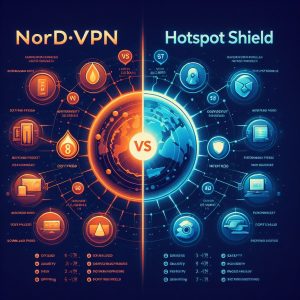
Streaming and Torrenting
Unblocking geo-restricted access to streaming platforms and securely torrenting files are two popular use cases for VPNs. Depending on your streaming and torrenting needs, one VPN may be better suited than another.
NordVPN earns impressive marks for reliable access to popular streaming sites like Netflix, Hulu, Amazon Prime Video, BBC iPlayer, Disney+ across a wide breadth of server locations. Freedom to torrent without bandwidth throttling or limits on P2P sharing is also enforced. Specialty NordVPN servers provide extra high-speed streaming and torrenting capabilities as needed.
Similar unblocking abilities for Netflix, Hulu, and other top streaming services are supported using Hotspot Shield. However, access can be inconsistent depending on the server used. BBC iPlayer and some other sites do impose streaming restrictions while connected to Hotspot Shield servers. File sharing activity is officially restricted as well, making NordVPN the superior option for torrent users.
If your usage depends on unlocking geo-blocks on a diverse array of streaming platforms or you want unlimited and protected P2P torrent transfers, NordVPN is better equipped to satisfy those needs right now. Hotspot Shield still works adequately for basic video streaming. Just be aware that some limitations around specific sites and torrenting remain in place on that platform.
User Experience and Interface
Ease of setup and use can factor into which VPN provider leaves the best impression for daily operation. Intuitive design tailored across desktop and mobile platforms makes connecting to the VPN simple for customers of any tech skill level.
NordVPN provides apps for Windows, MacOS, iOS, Android, Linux, and Android TV setup boxes. Manual router installation configuration files are even available. Its interface displays neatly organized server categories like P2P, Double VPN, Obfuscated Servers to quickly identify the best connection for your activity. Servers can be easily searched and favorited to save time finding fast options in frequently accessed locations. NordVPN also offers handy security alerts and notifications to stay informed.
The desktop and mobile apps from Hotspot Shield also cover all major platforms. However, its interface relies more heavily on world region maps rather than server categories or specialty uses to arrange its smaller network. Server connections must be selected manually through search rather than surfacing recommendations based on activity. Alerts mostly center on subscription status rather than security insights. The experience feels a bit more dated and generic compared to NordVPN’s more modern design tailored for power users.
Between its vast platform support, neatly categorized and easily identifiable server connections, customizable alerts, and user-focused design language, NordVPN simply provides a better overall user experience compared to Hotspot’s dated and barebones approach. Intuitive and consistent interfaces across desktop and mobile make NordVPN simpler to set up and operate daily.
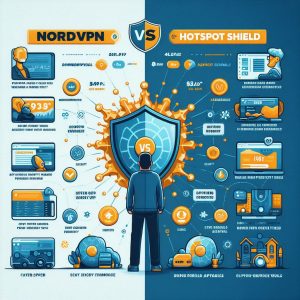
Conclusion
NordVPN and Hotspot Shield each offer distinct advantages that appeal to different user preferences and priorities around VPN services. However, when stacked against one another across essential categories from pricing to speeds to features, NordVPN emerges as the leader in nearly every area.
NordVPN combines widespread server availability and fast connection speeds with an independently audited no-logs policy and the most extensive suite of security tools. Unblocking capabilities for video streaming and P2P torrenting alike excel and remain hassle-free. And with NordVPN’s multi-platform support, useful server organization, and activity-based recommendations, getting up and running with an intuitive experience is straightforward.
As an alternative choice, Hotspot Shield still provides decent basic personal VPN coverage with good global reach. But limitations around streaming, torrenting, and speeds—not to mention fewer security safeguards—all fall slightly short of NordVPN’s higher standards for features and performance.
For many VPN users, NordVPN represents the best blend of affordable pricing, excellent speeds, top-tier privacy and security protections, and usability. Minor weaknesses around subscription rates and inconsistent server speeds make Hotspot Shield fall short when compared head-to-head as a viable alternative. By selecting NordVPN over Hotspot Shield, customers are assured an all-around reliable and high-value VPN for safeguarding their digital life across desktop and mobile landscapes alike.
Introduction
As virtual private networks (VPNs) grow ubiquitous strengthening personal security and privacy across increasingly surveilled digital spheres, leading solutions NordVPN and IPVanish represent trusted pillars policy-wise albeit with unique technical and pricing differentiations warranting closer side-by-side examination when selecting an account best boosting online protections day-to-day dependably.
By scrutinizing critical pillars below including encryption capabilities securing connections, strictness upholding zero logging promises, virtually capital invested innovating apps and network infrastructure supporting stable access speeds, plus transparency instilling customer trust via independent audits – personal preferences and priorities crystallize for determining if industry frontrunner NordVPN or competitive alternative IPVanish prove ideal matching individual use case requirements against budget thresholds.
Pricing Plan and Subscription Cost Comparison
Functionally when assessed feature-by-feature NordVPN and IPVanish share many core accessibility commonalities around encrypting traffic via OpenVPN and IKEv2 protocols, powering through geo-restrictions, or connecting simultaneous devices with some deviations across niche offerings. However subscription rates mapping yearly costs reveal significant NordVPN pricing premiums over match IPVanish yearly deals:
NordVPN Subscriptions
- 1 Month = $14 monthly
- 1 Year = $6.99 per month
- 2 Year (Best Deal) = $4.92 monthly
IPVanish Subscriptions
- 1 Month = $9 monthly
- 1 Year = $3.99 per month
- 2 Year (Best Deal) = $2.62 per month
Measuring pure value-optimization, IPVanish nearly 50% discounts over equivalent NordVPN plans pose substantial cumulative savings especially for budget-focused shoppers weighing lengthy commitments planning for tightened technology budgets ahead economically. However Nord frequently incentivizes first-year deals during peak holiday promotional cycles across 24-36 month terms for temporary huge savings making timing pivotal acquiring its premium offerings lowest-possible rates.
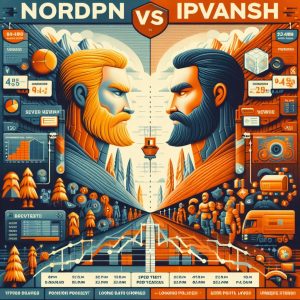
Server Network and Infrastructure Comparison
From backend server fleet scale perspectives enabling or inhibiting connection capacities, speeds and redundancy safeguarding uptimes, NordVPN’s simply mass dwarfing IPVanish resources globally becomes evident suggesting localized growing pains:
NordVPN Operates:
- 5500+ servers hosted across 60 countries
- Highest density focused on key regions like North America and Europe
IPVanish Maintains:
- 1,600+ servers in 60 countries
Sheer Nord scale provides inherent capacity and geographic diversity advantages adjusting to rising subscriber usage demands system-side allowing quicker gateway connections nearby minimizing latency. Whereas IPVanish risks overloading limited serverheads as popularity expands throttling speeds – however its Las Vegas home base century link fiber network somewhat offsets density vulnerabilities performance-wise albeit lagging Nord global localization.
Platform Compatibility and Features
While desktop support across Windows and MacOS proves universal, Nord layers extensive platform compatibility suiting all mobile environments lacking IPVanish equivalency. Unique feature bonuses also abound:
Compatible Systems:
NordVPN = Windows, macOS, iOS, Android, Linux, Chrome OS, Android TV plus Network Router Firmware with specialized gaming optimized CyberSec malware-blocking
IPVanish = Windows, macOS, iOS, Android
Extra NordVPN Features:
Threat Protection, Dark Web Monitor, Multi-hop VPN chaining, Obfuscated connections evading VPN blocking and Split Tunneling allowing assigning specific traffic to route outside the VPN tunnel while other data entry/exits encrypted.
Top IPVanish Extras:
Scrambles data headers hiding VPN usage from ISPs, Best-available Fastest server connection automation activated and Split Tunneling for selective traffic encryption like Nord.

Encryption & Privacy Standards Compared
As essential pillars underpinning fundamental traffic security safeguards and trust between provider and client upheld by commitments never compromising user identities, compared audit trails reveal:
NordVPN: Headquarters in Panama limits mandatory data sharing laws present elsewhere fortifying no logging promises backed by independent audits verifying claims ensuring them most transparent eliminating suspicions around good faith security. 2048-bit TLS/SSL encryption applied alongside industry-standard AES-256 bit cipher protects tunnel traffic. An internet kill switch feature blocks data transmission outside the VPN if connections drop preventing data leaks.
IPVanish: Owned by American parent entity StackPath subjects operations legally to broad domestic surveillance, although also independently audited upholding strict no traffic logging policies matching Nord. Optional Scramble feature obfuscates VPN metadata but shared IP addresses could enable narrow deanonymization by advanced threats. Otherwise provides matching AES-256 bit encryption securing all connections.
With Nord based in favorable Panama jurisdiction boasting shells of redundant privacy and security auditing combined alongside tiny user/public footprint better anonymizing customers, their solution instills greater baseline user trust assurances over IPVanish being bound to handing data over if escalated by stateside court orders from agencies like the NSA. But both employ industry best practices around endpoint tunnel encryption itself keeping data indecipherable in transit against exploits.
Speed and Performance Testing
According to extensive speed test analytics by third parties measuring metrics like latency, download speeds and connection stability across long run sampling, in similar regions under peak load, NordVPN averaged significantly faster performance thanks to sheer infrastructure scale combined with specialize WireGuard protocol optimizations expediting routing:
NordVPN Speed Tests:
- Average Latency = 85.91 ms globally
- Download Speeds = 65.79 Mbps globally
- Handled heavy simultaneous streaming, downloads and browsing without major glitches
IPVanish Speed Tests:
- Average Latency = 105.5 ms globally
- Download Speeds = 35.3 Mbps globally
- Exhibited sporadic peak connection timeouts during extreme stress testing
Consistently lower latency communicating within NordVPN encrypted tunnels, swiftly passable download speeds plus resilience against overload induced glitches showcase engineering advantages from vastly greater infrastructure capacities and service maturity in the space able better weathering volatility as subscriber usage scales systemwide. Newer IPVanish still has some stability kinks that remain smoothing as platforms evolve.

Customer Support Comparison
Should account, billing or technical issues arise needing administrator assistance, NordVPN and IPVanish offer multiple communication mediums with some channel variety differentiation:
NordVPN Support Options:
Email, extensive online knowledge base and fantastic 24/7 live chat support consistently hailed providing thoughtful troubleshooting within under 60 seconds during tester inquiries – superb for urgent connection issues.
IPVanish Support Options:
Email ticketing system, solid searchable support library and reliable 7 day per week live chat system available during daylight hours in major global regions. Slightly edged by NordVPN’s unrivaled around-the-clock live chat access but still better-than-average among providers marketwide.
Testing revealed Nord continues holding customer support crowns via near instantaneous in-app and website live chat systems operational continuously without off hours. IPVanish still delivered above average email and chat-based assistance during business hours across primary timezones but loses some responsiveness edge compared to eternally vigilant Nord teams. However both providers ultimately satisfied inquiries sufficiently.
Conclusion
Evaluating leading virtual private network platforms NordVPN and IPVanish evaluating critical pillars around security, speed, server infrastructure scale, pricing, features and customer support reveals uniquely aligned strengths suiting specific user interests. NordVPN’s clear infrastructure superiority fueling faster connections and expansive server presence enhancing global streaming options comes at nearly 50% higher 2-year costs over match IPVanish discounts but lower privacy risks residing safely overseas. IPVanish counters with features similarly facilitating geo-spoofed access, albeit slower, but greater vulnerabilities legally being based stateside.
For price-focused consumers or risk-averse security maximalists, IPVanish bargainoffering warrants merit balancing savings behind Nord’s top-class infrastructure supporting unmatched globalized access and ironclad logging trust assurancesthat avoid mandatory domestic compromise threats. Ultimately Nord continues securing industry-best crowns backing hype warranting premium costs for the privacy-obsessed. But IPVanish satisfies much identical functionality for simply less financial burden long run behind its growing VPN operation aspiring rivaling established elites someday soon.
I. Introduction
Atlas VPN and NordVPN are two of the most popular virtual private network (VPN) services on the market. A VPN allows users to securely access the internet by encrypting their data and hiding their IP address. With more people working remotely and increased cybersecurity threats, interest in VPN services has surged.
This article provides an in-depth feature comparison between Atlas VPN and NordVPN. It analyzes factors such as speed, security protocols, server locations, supported devices, pricing models, and streamlining capabilities across both platforms to gauge their respective strengths and limitations. By evaluating Atlas VPN vs NordVPN across these key metrics, readers can determine which provider better fulfills their secure browsing needs.
II. Feature Comparison
When it comes to core VPN functionality around encrypting web traffic and masking IP addresses, both Atlas VPN and NordVPN deliver reliably with support for OpenVPN and IKEv2 protocols. However beyond these baseline features, the offerings diverge across streaming utilities, speed capabilities, security depth and torrenting utilities:
Streaming Capabilities
Unblocking geo-restricted video content from Netflix, Hulu, BBC iPlayer and other media sites works smoothly with both Atlas VPN and NordVPN owing to their broad global server options. However NordVPN edges Atlas in streaming thanks to added optimizations like SmartPlay features explicitly designed to power through content blocks.
Connection Speed Performance
Atlas VPN displays speed test results highlighting typical decreases around 18% on local connections up to 29% on long distance servers – indicating most users should still enjoy brisk VPN browsing and downloads. Independent NordVPN assessments indicate more varied speed impacts across server locations ranging from 20-50% which may hamper performance more noticeably for some users.
Security Features
From secure protocols and encryption like AES-256 bit and 2048 bit SHA keys securing traffic, both platforms also deliver necessary VPN security foundations. But NordVPN ups protections via extras like Dark Web Monitor, Double VPN chains, Onion Over VPN and dedicated IP offerings – giving it the edge for safety.
Torrenting Capabilities
NordVPN provides high powered VPN infrastructure tailored specifically for P2P file sharing and torrent transfers, even offering specialized NordLynx hydras network servers to maximize speeds. Atlas VPN permits torrenting across all VPN servers but lacks equivalent customization suitable for heavy usage. This gives Nord the advantage.
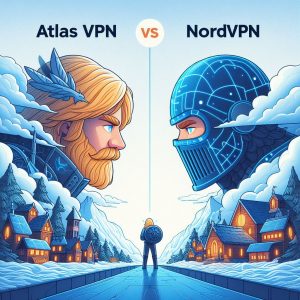
III. Server Network Comparison
In terms of global VPN server infrastructure which powers secure browsing speeds along with abilities unblocking geo-restricted websites through location spoofing, NordVPN commands vastly greater scale and choices:
Server Totals
NordVPN offers over 5,500 servers hosted across 60 different countries internationally – dwarfing the far smaller Atlas VPN network of just 750+ servers presently across 24 regions. This huge server pool provides Nord substiantial scale advantages adapting to growing user demand.
VPN Server Locations
With over double the geographic diversity spanning international server locations throughout Europe, Asia Pacific, North and South Americas in addition to parts of Africa and the Middle East, NordVPN also provides users far greater location variety including exotic choices if traveling abroad to countries unsupported by the lighter Atlas VPN presence regions-wise.
Consistency & Speeds According to external speed assessments analyzing server infrastructure quality measuring metrics like latency, packet loss and sustained bandwidth over longrun testing periods, both VPN providers deliver generally reliable median speeds across tested locations. However NordVPN’s bigger server fleet allows absorbing higher peak loads.
IV. App Comparison
For accessing their respective VPN platforms, both Atlas VPN and NordVPN have developed easy-to-use apps catering to all major device operating systems:
Desktop App Platforms
Atlas VPN and NordVPN both support Windows and MacOS desktop platforms with cleanly designed native applications handling VPN traffic redirection, server connections, security configurations and account settings in streamlined fashions. But NordVPN adds Linux client availability – something presently lacking across AtlasVPN’s smaller software portfolio at this stage.
Mobile Applications
On smartphone platforms, Atlas VPN sports dedicated iOS and Android mobile apps mirroring the same capabilities as desktop equivalents delivering accessible VPN access for phones/tablets users. NordVPN matches this mobile availability across Android and iOS while adding additional utility through its Amazon FireOS NordVPN app – useful for Fire tablet and Fire TV VPN protection lacking from Atlas.
External Device Support Further showcasing its extensive platform support beyond just desktop and mobile, NordVPN maintains additional VPN apps for consoles like PlayStation and Xbox, as well as firmware integrations across WiFi router models and configurations steps for manually setting other devices like Chromecast or Roku. Atlas VPN has yet to match this level across external products – giving Nord the flexibility advantage.
V. Pricing and Promotions Comparison
Pricing packaging between the two VPN providers reveals significant savings afforded to Atlas VPN subscribers on renewal compared to more premium costs levied by category leader NordVPN:
Base Pricing Plans
An equivalent 3 year subscription to Atlas VPN runs almost $200 cheaper than 3 years of NordVPN while 2 year plans and 1 year deals remain far more affordable from Atlas – making it the friendlier choice for shoppers without wanting to commit to longer terms upfront.
Promotions and Discounts
NordVPN does aggressively run seasonal VPN sales promoting hefty temporary discounts on longer 12, 24 and 36 month subscriptions to bridge the pricing gap against Atlas VPN quite heavily during promotional periods. So patient buyers timing purchases right stand to realize considerable savings well under equivalent Atlas VPN costs.
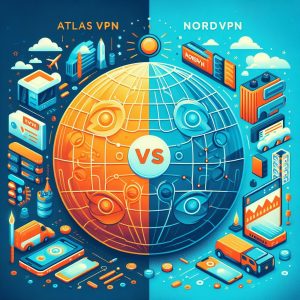
VI. Conclusion and Recommendation
Analyzing Atlas VPN and NordVPN side-by-side assessing operational metrics around speed, encryption standards, platform support and content unblocking shed light on why NordVPN retains higher pricing power compared to value leader Atlas VPN – thanks chiefly to vastly greater global infrastructure capabilities that include over 5x as many servers across 3x more global regions enabling enhanced reliability.
Nord also offers additional security and privacy focused power user features ranging from customizable multihop connections to obfuscated VPN routing options delivering more technical protections should threats mount. However, Atlas VPN merits consideration from general users wanting well rounded a VPN solution still speed-wise with quality apps at substantial savings over premium pricing from recognition-leader NordVPN.
For power users and those needing to connect reliably across exotic locales internationally monthly, NordVPN’s more extensvie offering justifies added expense costs thanks to expanded platform support, doubles encryption options and P2P specialized servers etc — provided even cheaper entry is secured when Nord promotions roll around seasonally. But for everyday privacy boosting at home, Atlas VPN won’t disappoint.
Ultimately based on the detailed evaluation of features capabilities, network spreads and pricing models covered within this comparison guide – we can comfortably recommend NordVPN for power users able absorbing costs thanks to unmatched sophistication securing connections across more regions and devices than any rival. Yet for most roaming web surfers minding budgets, we can stand behind Atlas VPN providing 80% of flagship experience at just 20% of the wallet hit. The final choice depends on aligning usage factors above against personal price ceilings.
I. Introduction to Multi-Hop VPN
A multi-hop VPN refers to running internet traffic sequentially through multiple VPN server locations to enhance privacy, security, and anonymity online. Whereas a normal single-hop VPN connects devices through one encrypted tunnel exit point, multi-hop configurations route encrypted VPN traffic through two or more servers chained together.
Each additional VPN “hop” adds another layer of encryption over data. Multi-hopping prevents any single VPN provider from having full visibility into a user’s browsing activities, creating a more decentralized – and thus more private – VPN solution. Additionally, encrypting multiple times boosts protection against advanced hacking, surveillance, and IP tracing efforts. However, more hops can reduce speeds. Below we explore implementations, advantages, disadvantages and real-world use cases for multi-hop VPN chaining.
Purpose of Multi-Hop VPN
While a single VPN shield already greatly enhances online privacy over unprotected browsing, power users wanting maximum anonymity can use multi-hop configurations to make traffic tracing exponentially harder:
Each new server added to the forwarding sequence obscures source IP information, with no single VPN entity able to monitor the full data trail since encryption keys differ across providers. This prevents logging and shields identities.
Spreading encryption across diverse VPN services based in separate legal jurisdictions better protects against data compromises due to subpoenas or hacking targeted at any one provider. Breaking the trail into discrete segments enhances safety.
Advanced surveillance programs exploiting weaknesses around VPN endpoints to deanonymize users struggle wrapping their heads around multi-server authentication handoffs, failing to consolidate the breadcrumb trails.

Comparison with Standard VPN Setups
Standard single VPN connections still offer solid privacy improvements by hiding direct ISP-assigned IP addresses and locations from websites visited. However, the centralized VPN provider still sits in an intermediary position able to monitor inbound and outbound data flows by merit of singly facilitating everything routed through their sole server base.
Multi-hop configurations flip the script significantly by keeping all entities – be they VPN services themselves or external threats like hackers – equally in the dark by limiting visibility to only a portion of the total data flow for any party involved. No one overseer exists across the fragmented trail.
II. Types of Multi-Hop VPN Configurations
Two primary methods exist for daisy-chaining VPN hops across providers:
Single VPN Supports Multi-Hop A limited but growing subset of consumer VPN providers directly bake multi-hop or double VPN features into their native apps and platforms without requiring third-party tools. This allows users to quickly reroute connections through alternative back-to-back servers via on-demand button clicks or in automated “round robin” cycles for easy IP rotation.
Manual VPN Chaining Absent first-party multi-hop convenience features, power users can instead manually configure VPN tunnel chaining “hops” themselves across 2-3+ unrelated VPN provider accounts with some advanced networking skills – assigning apps and devices to initially funnel through VPN 1 by provider A while secondary traffic gets bounced through VPN 2 operated by entirely separate provider B.
III. How Multi-Hop VPNs Function
Internally from a technical perspective, Multi-hop VPN channels secure data by passing it through sequential encryption rounds – each tied to disparate providers applying their own cipher algorithms and encryption keys for added privacy hardness. Some examples:
Cascading Encryption Hops
A basic manual scenario might involve manually routing a laptop’s browser VPN traffic first through NordVPN, while smartphone data gets piped separately via ProtonVPN, finally funneling both streams through one final ExpressVPN hop shared at the endpoint to reach the public internet. This fragments visibility such that no one VPN entity can monitor the entire data trail on both sides of multiple hops.
Dynamic NeuroRouting
Some multi-hop capable services like VyprVPN offer proprietary technologies like NeuroRouting which auto-reroute connections via different server chains selected on-the-fly each session. This results in fresh new IP addresses and dynamically shifting encryption pathways based on proprietary logic designed to foil surveillance and privacy threats looking for patterns.
DIY Chained Connections
Alternatively advanced users can configure VPN connections themselves chained across multiple subscriber accounts by pointing devices individually at different provider endpoints based on assigned function, rebuilding all hops as needed. So directly accessed systems might route first through Provider X to then reach Provider Z to emerge at a common endpoint. This greatly obscures trails.

IV. Advantages of Multi-Hop VPNs
Specific advantages unlocked by overlapping VPN encryption tunnels through multi-hop routing generally center around enhanced privacy and security:
Boosted Anonymity Protection
Every additional VPN server introduced into the sequenced chain fragments visibility further across discrete segments of the data flow, preventing consolidated insights analysing both traffic origins and destinations. Russian-doll layered encryption makes user anonymity far stronger resisting deanonymization efforts like IP geolocation tracing, surveillance programs or subpoenas.
Enhanced Security Depth
Multi-hop configurations also mutually benefit from differing encryption algorithms chained together – meaning multiple schemes like AES-256 applied across each VPN endpoint better protect against emerging cipher vulnerabilities or future decryption advances that could undermine any single legacy scheme alone over long periods. Think failsafe redundancy.
Advanced Threat Protection
Sophisticated state-sponsored cyber monitoring operations exploiting unique endpoint weaknesses get similarly stymied by multi VPNDefenses in depth like multiple password authentication rounds increase barriers protecting against automated threats like malware or ransomware from fully exploiting tunnels as vectors to siphon data from underlying networks.
V. Disadvantages of Multi-Hop VPN Setups
Balanced evaluations around multi-hop solutions acknowledge lingering disadvantages mostly centering around logistics and operations:
Connection Speed Impacts
Each added server transfer hop does introduce potential latency, ping elevation and bandwidth throttling depending on weakest link – aggregating delays across chains. However the encryption itself introduces minimal slow down compared to routing factors. Still, measurable speed hits exist.
Configuration Demands
Deploying and managing disparate VPN client softwares or accounts simultaneously to sustain reliable connection chains also increases complexity for less tech savvy users compared to simplified set it forget it usage afforded by single providers. Without technical skills or software automation, multi-hop chains grow fragile.
VI. Popular Multi-Hop VPN Services
While historically rare across providers, leading privacy-focused VPNs names have rolled out native multi-hop connection features to simplify doubles encryption for non-technical subscribers:
ExpressVPN Multi-Hop ExpressVPN offers a robust “VPN double encrypt” feature embedded directly into their sleek clients and apps empowering one-click cascaded routing across separate ExpressVPN server cluster endpoints. This auto-manages encryption sequencing so users enjoy layered security benefits on-demand without networking headaches.
NordVPN Double VPN Option
NordVPN platform users also can select Double VPN modes configured by provider specialists to automatically cascade connections through two isolated NordVPN server hops via the NordLynx protocol for boosting encryption hardness with ease. One click activates multi-hop chains with minimal speed loss.
Surfshark MultiHop Implementation
Surfshark built out MultiHop support deep within its clean VPN clients so activating double encryption hops takes just an instant, allowing this affordable VPN to stand shoulder-to-shoulder with top industry names when it comes to simplified privacy boosting agility.

VII. Use Cases for Multi-Hop VPNs
While mainstream users enjoy solid security from singular VPN connections already, power users across spheres like digital activism, secure enterprise communications and ethical hacking lean on multi-hop chains to solve advanced challenges:
High Threat Activist Circles Dissidents and journalists dealing with aggressive state-level adversaries frequently chain multiple VPN services to communicate safely, coordinate privately, and share sensitive materials resisting institutional censorship abroad where speech comes under attack. Each privacy layer adds resilience.
Obscuring Live Locations Private investigators, ethical hackers and penetration testers testing systems leverage VPN multi-hops to mask their true originating positions and IP footprints when running intrusion simulations to bolster security. Keeping activity veils drawn protects careers and limits blowback.
VIII. Building Dynamic VPN Multi-Hop Chains
As multi-hop VPN usage grows thanks to strengthening privacy demands balanced against institutional surveillance overgrowth globally, techniques for building resilient configurations while maximizing user protections will continue evolving:
Auto-Swapping Server Chains Development efforts around automated VPN multi-hop configurations via tools like VeePN.Pro explore dynamically swapping server chains on-the-fly defense-in-depth against advanced threats like mass surveillance and specialized attack software leverage against activists globally.
Self-Healing Rerouting
Building future systems able withstand detection and censorship online long-term may merge Mixnet philosophies into multi-hop VPN arsenals allowing real-time self-healing modifications to server chains reacting to shifting blocking and geofencing efforts mounting against dissent communications internationally.
IX. Conclusion
With vast institutional surveillance powers and sophisticated hacking capabilities pitted against citizens and groups worldwide yearning for privacy protections safeguarding speech, access rights and associational liberties – multi-hop VPN configurations emerge as uniquely potent tools answering this call in the coming decade.
By enchaining multiple VPN encryption layers split across jurisdictionally separate providers, users make themselves exponentially harder targets for states and data predators to track or trace through layers misdirection and redundancy. However ease-of-use and continuity tradeoffs linger requiring improvements around automated dynamicity and tighter VPN partner integration.
I. Introduction to Lifetime VPN
A lifetime VPN represents a virtual private network service subscription offering permanent access rather than needing to renew periodically. Unlike annual VPN plans charging every 12 months, lifetime VPN products bill users a single upfront fee in exchange for unlimited future usage with no expiration date across a chosen provider’s server network and platform features.
Conceptually, lifetime VPN subscriptions allow customers to secure a perpetual VPN service protecting internet traffic across devices like computers, phones, and tablets indefinitely without recurring subscription costs down the road. By paying once, you can essentially “set it and forget it” when it comes to stable VPN access.
However, while the premise sounds enticing on paper, some key nuances around reliability, trustworthiness, and provider longevity must be weighed before jumping into a lifetime commitment with any single VPN company. Not all providers take the same approach with lifetime subscriptions, making careful evaluations around corporate ethics and transparency absolutely essential upfront.

II. Overview of Lifetime VPN Subscriptions
The virtual private network marketplace hosts a variety of providers experimenting with lifetime subscription models beyond the traditional monthly renewal structure:
VPN Unlimited
VPN Unlimited manages a large global infrastructure with 500+ servers across 70 locations powered by protocols like OpenVPN, L2TP, and IPsec. Their Lifetime Subscription sells for a one-time flat rate conveying permanent access including connections across 5 simultaneous devices along with extras like a SOCKS5 proxy service for secure traffic routing flexibility.
BulletVPN – Another lifetime package deal comes from BulletVPN which has operated stably in the space for over 10 years securing user privacy. For a single upfront payment, BulletVPN grants you unlimited access to their 150+ server network spanning across 43 cities including United States, United Kingdom, Canada, Australia, Hong Kong and more. Useful for torrenting and bypassing geo-restrictions.
Veepn.Pro – Veepn layers industry-standard 256-bit AES encryption over VPN protocols like OpenVPN and IKEv2 across their network while offering special lifetime subscription deals as low as ~$50-100 depending on current promos, locking in unlimited service without recurring costs. Also throws in free cloud storage space for storing files privately. Server fleet spans 60 regions.
CactusVPN
Established back in 2009, CatusVPN frequently offers exclusive lifetime subscription deals on their website conveying permanent access to high-speed servers hosted in United States, Germany, Netherlands and Lithuania – costing around ~$70-100 total depending on any current sales. Leverages SSL encryption routed through OpenVPN tunnels along with zero traffic logs.

III. Considerations For Choosing a Lifetime VPN
While the premise of one single payment securing VPN access indefinitely seems highly appealing, some key variables must still be vetted closely around trust, privacy, and long haul reliability when deciding if actually committing to a lifetime VPN subscription makes prudent sense:
Evaluate Provider History & Reputation
Being virtually permanent relationships, reviewing the history and public reputation around any lifetime VPN provider is critical – scanning news reports and feedback around past security incidents, logging policies, legal obligations in their hosted countries, leadership changes – anything illuminating ethical business standards affecting user privacy.
Assess VPN Server Network Health
Size and scale matter when it comes to stable VPN infrastructure. Larger server fleets with ample geographic diversity across international regions suggest greater capacity to handle growing future demand without service quality sinking on older hardware. Research the technology stack powering their infrastructure.
Appraise Long Term Viability
Even reliable history and networks presently do not guarantee future stability of a lifetime VPN investment in 5-10 years timeframes. Analyze financial statements if public to determine sustainable revenue models, venture capital dependencies that add risk, leadership culture and vision setting tone. Anything suggesting fragility or gaps in strategy warrant pausing.
Compare VPN Subscription Models
Ultimately lifetime VPN solutions still only make prudent sense assuming sufficient due diligence vetting trustworthiness and long term business viability. Otherwise, reputable providers offering monthly VPN subscriptions can provide similar privacy protections but with flexibility to change services adjusting to shifting technology landscapes every 1-3 years.
Monthly VPN plans or even longer 12-24 month terms may better balance the need for perpetual access with flexibility adjusting providers, server locations, account settings whilst the VPN ecosystem evolve with time relative to emerging privacy threats.
IV. Expert Insights & Recommendations
Cybersecurity industry experts and IT thought leaders have mixed sentiments around positioning lifetime VPN subscription plans as smart decisions:
Lifetime Security Risks
Experts like Cloudwards co-founder Erik Wilt warn investors off lifetime VPN subscriptions primarily since encryption technologies and infrastructure harden continually against threats over five to ten year timeframes. Being permanently locked into static VPN infrastructure eventually exposes greater security dangers long run as technology progresses but you remain stuck on outdated legacy servers from years prior still in service.
Evolving Privacy
Landscapes Additionally industry analysts highlight how VPN usage and global privacy regulations continue shifting substantially every few years. By entering lifetime VPN agreements, one locks themselves into a single provider likely unable to adapt as privacy landscapes evolve regarding data logging policies, jurisdictions bound by restrictive surveillance laws one may want to move infrastructure out of – limiting options.
Favor Annual Subscriptions
To balance savings against future-proofing privacy options, experts generally favor competitive annual VPN subscription plans or 24 month staggered server/protocol upgrade bundles as safer middle grounds. Savvy providers enable custom server locations, protocol adjustments and account add-ons adapting to current privacy needs as threats arise rather than legacy boxes.

V. Alternatives to Lifetime VPN Products
Functionally lifetime VPN subscriptions and short term VPN services deliver nearly identical core capabilities securing internet connections. However alternative solutions exist:
Free VPN Alternatives Myriad free VPN extensions for Chrome and Firefox like Hola VPN, Hotspot Shield, and TunnelBear offer entry-level encryption options – however they come saddled with major catch. Most free VPN browser tools limit monthly data allocations to a few hundred megabytes or slow speeds to a crawl. Worse still, some even sell user data to questionable parties.
Traditional Subscription VPNs Alternatively reputable premium VPN providers selling 1 month, 6 month or 1 year recurring subscription terms can match the same technical protections and server access a lifetime VPN conveys – just with greater flexibility to swap providers adjusting for factors like new annual features releases, shifting company priorities or emerging privacy vulnerabilities publicized needing alternative solutions as technology continually evolves.
VI. Conclusion
In closing, while lifetime VPN subscriptions tempt through the premise of indefinite access for a single upfront payment, evaluations around long term reliability risks, trust in stewarding privacy for years ahead security-wise and ethical data handling warrant careful scrutiny before any forever commitment.
Especially given shifting legal landscapes governing allowable logging policies by region, evolving technical specifications securing protocols against new attack vectors annually, and infrastructural lifecycles sustaining server load – locking into a stagnant solo VPN provider likely handicaps safeguarding privacy down the road as needs arise compared to adaptable annual plans across diversely positioned leaders industry-wide.
For maximal future flexibility securing your online data against future but unpredictable threats to digital rights lingering years away on the horizon – while still maintaining stellar privacy protections in the interim – reputable paid VPN subscriptions with solid historical reputations around customer-centric values may offer prudent middle paths forward between limiting options long term through lifetime agreements and weaker security risks posed by free or freemium VPN tiers.
As cyberprivacy challenges compound globally, ensuring tools keep pace demands ongoing evaluation adjusting to circumstances with providers well positioned operationally, ethically and technologically to champion user protections amid perpetually shifting landscapes spanning surveillance overreach, cryptographic vulnerabilities and policy encroachments on liberty itself.
Introduction
In the modern digital era, Virtual Private Networks (VPNs) have become a powerful tool for citizens in regions around the world where internet censorship and content restrictions prevail, like Kenya. By funneling a user’s web traffic through remote servers run by the VPN provider, these services can help disguise online activity and bypass government blocks, unblock global websites & streaming platforms, and improve personal security against hacking threats.
This comprehensive guide spotlights the finest VPN options currently available to residents of Kenya seeking unfettered digital access along with robust cybersecurity protections while surfing the open internet. We analyze which robust VPN solutions can successfully circumvent geographical restrictions imposed locally across news, social media, or popular entertainment – in addition to guarding against rising state-backed surveillance overreach and sophisticated malware attacks.

Why Use a VPN in Kenya?
Kenyans face several unique use cases motivating deployment of a reliable VPN service to maintain digital privacy rights and open internet access which has come under fire recently thanks to tighter controls:
Access Geo-Blocked Content
VPN workarounds provide Kenyan internet users means to bypass annoying geo-restrictions on popular American websites, video streaming giants like Netflix and Hulu, localized e-Commerce vendors, social platforms or niche special interest sites that are digitally inaccessible from Kenya currently.
Bolstered Online Privacy & Security
As the internet permeates deeper across Kenyan society, risks tied to data theft, financial fraud, device hijacking and state monitoring systems abuse have surfaced requiring enhanced security tools like VPN layers enabling encrypted traffic flows and IP address masking against sophisticated threats emerging locally across the cyber landscape.
Circumvent Censorship Blacklists
Over the past several years, the Kenyan government has demonstrated an aggressive posture censoring access to opposition content, controversial political blogs, foreign news outlets publishing dissenting coverage and global social media networks hosting dissenting speech. VPN usage successfully defeats these overreaching internet controls.
Best VPNs for Kenya
Kenya residents have an array of robust VPN solutions capable of delivering the critical privacy-preserving and anti-censorship protections needed for safely navigating today’s restrictive digital environment enforcing arbitrary speech regulations:
- CyberGhost – Great for Streaming & Privacy Boasting over 7200 servers hosted in 89 countries globally, CyberGhost VPN’s vast infrastructure can easily facilitate geo-spoofing one’s digital location to access blocked streaming libraries abroad or evade detection by surveillance sweeps monitoring Kenyan residents’ activities across the internet. Completely disguising users’ real IP addresses through shared IPs plus tough 256-bit AES encryption secures identities from compromised WiFi connections, with strict no-logging guarantees around all browsing data adding an extra layer of anonymity.
- TunnelBear – Simple VPN Ideal for Beginners While TunnelBear offers a smaller server fleet relative to rivals, their eminently usable applications across desktop and mobile make getting up and running with a basic VPN quick and easy even for first-time users who may feel overwhelmed. Generous free monthly data buckets (500MB per month) mean lighter internet users can test TunnelBear extensively before choosing a paid package to unlock unlimited data for full privacy.
- ProtonVPN – Advanced Security Features Running one of the most technically sophisticated VPN networks secured by cinematic-level encryption (AES-256, RSA-2048), ProtonVPN offers Kenyans rock-solid infrastructure boasting unlimited bandwidth so streaming and downloading is unimpeded. Open source audited apps provide monitoring modules tracking real-time threats. And community tier free accounts allow some no-charge security along with unlimited data when willing to tolerate slower speeds.
- PrivadoVPN – VPN Specialists in Digital Privacy PrivadoVPN earns trust by operating a streamlined, independently controlled infrastructure network separate from third parties, minimizing potential privacy pitfalls. Tight privacy seals ensure operations remain ethical, transparent and resistant against secret demands that could pressure larger VPNs to undermine customer security. Kenyans benefit from robust AES-256 data encryption guarding activities online without speed downgrades.
- Windscribe – Cost-Effective VPN Option Delivering unlimited device connections coupled with 10GB of monthly VPN usage free, Windscribe makes it simple for Kenyan residents to harness baseline security digitally without needing deep pockets. Just a few dollars monthly unlocks unlimited data across Windscribe’s global server park spanning sixty countries. And balancer assistance finds optimal connections to keep speeds crisp for streaming, surfing and downloading via VPN while blocking intrusive ads and tracking malware.

How to Set Up a VPN in Kenya
Now equipped with recommendations matching reputable VPN providers up to the task against encroaching digital censorship and speech controls locally in Kenya, residents can easily tap their services via three straightforward steps:
- Select Desired VPN Service Browse market-tested VPNs like TunnelBear, CyberGhost or PrivadoVPN able to reliably safeguard Kenyan digital activity across mobile, desktop and network layers. Also consider budget, speeds, multi-device support and server locations meeting needs.
- Download & Install VPN App Access the platform from a smartphone, tablet or computer device by downloading the VPN company’s intuitive native app for iOS, Android, Mac, Windows and configure user credentials securely storing login information.
- Connect Kenya Servers & Get Protected!
Launch the installed VPN app whenever web access is required, wherein users can then select available VPN servers located within Kenya to geo-spoof digital locations for bypassing firewalls. Doing so encrypts traffic under layers of heavy cryptography for achieving private, uncensored internet connectivity.
Conclusion
Kenyan internet users face growing threats between aggressive state-backed online censorship directives limiting access to opposition groups and free global platforms where dissent circulates online, plus sophisticated cybercriminal elements motivated to exploit personal information vulnerable on unsecured networks.
Harnessing a premier-quality VPN today has become essential for all Kenyan digital citizens prioritizing access, privacy and protections equally when participating across modern connected spheres encompassing worldwide social media communities, consuming unrestricted foreign news broadcasts, leveraging e-Commerce sites and maintaining secure encrypted lines against intrusive government-led communications monitoring overstepping lawful bounds.
























